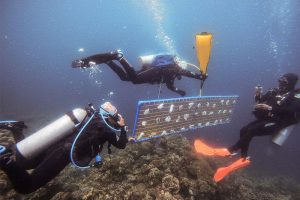
DIVERS IN BATANGAS CREATE NURSERIES FOR RESCUED CORAL
BAUAN, PHILIPPINES —A group of scuba diving experts and enthusiasts are setting up coral nurseries in a popular dive spot south of Philippine capital Manila to help in the propagation and recovery of damaged coral.
In coastal town Bauan in Batangas province, divers collect coral damaged and dislodged by natural calamities and man-made interference such as plastic waste and dynamite fishing, and salvage living parts before placing them in coral nurseries.
“If we select those that are actually more tolerant to climate change, to higher temperature, that can survive higher temperature, then you can actually propagate more, so next time you are actually like building a reef of the future,” said marine scientist Sam Shu Qin, co-founder of non-profit conservationist group Our Singapore Reefs which is taking part in the initiative.
Bauan, a two-hour drive from Manila, boasts a diverse coral population which has attracted diving enthusiasts for decades. But its coral has frequently suffered from natural hazards such as typhoons and human-caused destruction, endangering the ecosystem and tourism industry.
In 2020, parts of surrounding Batangas province suffered a mass coral bleaching event – when high temperature turns coral white through algae loss – with about 72 kilometers (45 miles) of coastline affected, said conservationist group Reef Watch Philippines.
It prompted Bauan-based scuba diving instructor and resort owner Carmela Sevilla to plant nurseries for detached coral, and invite likeminded conservationists to join the initiative.
Aside from providing a home for orphaned coral, nurseries serve as repositories in case there is a need to replenish coral amid environmental challenges brought by climate change, such as mass bleaching.
The Philippines is an archipelago of more than 7,600 islands with nearly 36,300 km of coastline, making it one of the world’s most marine resource-rich countries.
But some areas may suffer in what the U.S. National Oceanic and Atmospheric Administration expects to be declared the fourth mass global bleaching event within the next three months.
“The goal is not to make such a huge difference, to be able to stop climate change or be able to really create a huge impact on conservation,” said Sevilla who, with volunteers, has so far collected 64 pieces of damaged coral for two nurseries.
“Small efforts are what will make a difference because it builds up over time, it builds up slowly, and it’s something that can last, and it helps create an impact,” she said.
— Reporting by Peter Blaza; Editing by Christopher Cushing
2024-04-16T03:43:54Z dg43tfdfdgfd